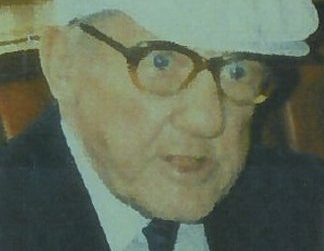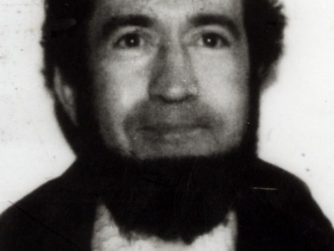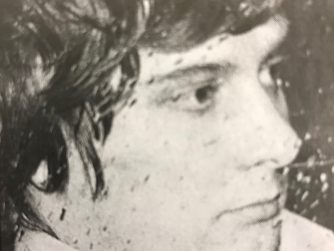
The village of Eversley is a small village located in the community of Hart in the county of Hampshire, UK. It is a wealthy community, located close to the large towns of Basingstoke and Reading, and is considered peaceful and relatively crime free. Eversley is an old English term meaning “Wild boar clearing”, and a testament to this is reflected in the presence of a boar depicted in the village sign.The type of place every family would enjoy living in.
The one blot on the otherwise idyllic appearance of Eversley, however, is that since 1992, Eversley has lived in the shadow of a brutal, still unsolved murder.
Jacqueline Palmer-Radford was 40 years old in 1992, and lived with her two sons, aged 17 and 6, in a converted Post office, Riversdale House, on the main road running through Eversley. Jacqueline and her husband had separated amicably in 1990 after 18 years of marriage, and since then her and the boys had remained in the family home. There were plans for Jacqueline to put the house on the market and move to a smaller house, although the house had not yet been put on the market.
Wednesday 01 April 1992 started as a day like all others for Jacqueline and the boys. Her oldest son attended college some miles away and commuted via train, so Jacqueline dropped her older son at the nearby train station at about 8:30am. As usual, on the return journey Jacqueline dropped her youngest son at his school in the village of Crowthorne, four miles away. She was back at Riversdale House by 9:15am, which can be confirmed as she spoke to her mother on the telephone at this time. Jacqueline had sounded fine and her usual self, and told her mother she was going to spend the day shopping in Basingstoke.
What happened that day has never been confirmed.
At 4pm that day, Jacqueline’s youngest son was still waiting for Jacqueline to collect him from school. This was most unlike Jacqueline – she was a conscientious mother and her life revolved around her sons. If she was going to be late for any reason she would have telephoned the school, or made arrangements for him to be safely collected. Her eldest son was also waiting at the train station to be collected. Eventually, he made his own way home, arriving at about 17:30pm.
What he discovered is something that no child should ever have to discover. He found his mother lying on the kitchen floor of their spacious home, suffocated. According to differing reports, she had also been raped.
As with most cases, Jacqueline’s estranged husband was an immediate suspect in her murder. He was arrested and questioned, but was able to provide an irrefutable alibi for his movements the entire day, an alibi that was corroborated by witnesses. Police were to eventually completely rule him out of the inquiry.
By the time June 1992 had arrived, the police inquiry was nowhere nearer to solving the case. There were a few points of appeal that they had to make, and a TV appeal was made through Crimewatch UK. The Crimewatch appeal was aired on Thursday 18th June 1992, and built up a picture of Jacqueline’s life and what was known about the days leading up to the day she was murdered.
What emerged was a picture of a doting mother. Since her separation, Jacqueline’s life had revolved around her sons, and she did lots of activities with them. Jacqueline wasn’t employed at that time, but kept herself busy and had begun to widen her interests and social circles. She began playing many new sports, such as tennis and badminton, widening her circle of friends in the process. She had also made enquiries into undertaking a study course through the Open University. She was well liked and all who were interviewed testified to her good character. None of Jacqueline’s friends or family knew of any romantic relationships that Jacqueline was involved in, her life seemed to revolve around her sons.

The Crimewatch appeal focused predominantly on two vehicles and their occupants that police wished to eliminate. The day before Jacqueline was murdered, she had picked her youngest son up from school at 3:15pm as normal. At the same time, one of the other parents at the school remembers seeing a brown hatchback car, possibly a Vauxhall Chevette, parked across the road. The occupant did not seem to be watching the school but instead seemed nervous and tense, staring straight ahead.
Crucially, what could have possibly been the same car was sighted the next day, the day of Jacqueline’s murder, right outside Riversdale House at 9:05am. Chris Gayler was on his way to work in Reading, and his daily commute took him through Eversley and past Riversdale House. As he pulled level with the driveway to Jacqueline’s house, he had to wait behind a brown hatchback car, similar to the one sighted at the school the day before. The car was indicating right, and turned into the driveway of Riversdale house. Who was the caller?
At about the same time, employees of an office block located about 200 yards down the road from Riversdale House noticed an unfamiliar car parked in their car park. The car was either a beige or yellow coloured Metro, and the occupant was a lone woman. When she was first sighted, she had a headscarf on and was reading a newspaper as though to hide her face from view. Office employees checked periodically and the car remained there for a number of hours, and later on they noticed that she had removed the headscarf. She was described as being in her mid to late 20’s, slim, and short haired. She had left the car park by 12:00pm – who was she?
There were two other people that police wished to trace. A motorist driving nearby remembers a man running down the road away from the direction of Riversdale House at about 11:00am. This man was described as wearing a raincoat, jogging bottoms and trainers, and was carrying a carrier bag in each hand. Then at about 12:00pm, a motorist driving past Riversdale House noticed a smartly dressed man carrying a clipboard stood outside the house. As mentioned, Jacqueline had plans to sell the house and downscale – was this an estate agent? Nobody ever came forward to eliminate themselves. Perhaps this man dropped an expensive pen whilst he was there – a search of the house and grounds found a distinctive pen on the driveway. It’s retail value (in 1992) was between £30-32 pounds, so it was quite a substantial amount then and surely wasn’t just a throwaway item. It did not belong to Jacqueline or any of her sons, and police enquiries failed to establish its owner.
It is a very sad case indeed, and frustratingly information on it is very scarce. What can be established? There are conflicting reports about the murder, with some stating that Jacqueline was sexually assaulted and others not mentioning this. The Crimewatch UK appeal certainly negated to mention this fact. An article on the True Crime Library alludes to Jacqueline having been raped, yet was found fully clothed. Would a rapist killer bother to redress his victim? It goes on to suggest that Jacqueline was killed by someone she knew, someone who raped her and then killed her when she threatened to report him. But would a killer bother redressing his victim? TTCE thinks this is unlikely, but cannot deliver a definite opinion due to conflicting reports. The presence of a sexual assault or the lack of a sexual assault presents two differing offender profiles, and as TTCE is unsatisfied as to the evidence for or against, cannot comment upon this.
It does however, seem likely that Jacqueline was killed by someone she knew. She spoke to her mother at 09:15am on the day she was murdered, and her mother reported that Jacqueline sounded fine and was heading out shopping for the day. If the sighting of the brown car turning in to Riversdale House driveway is correct, and the timing is correct, then the driver must have been at the house during the phone call to her mother – meaning it was someone Jacqueline knew and was comfortable enough to let into her home. There were no signs of forced entry or any signs of struggle, which further supports this theory. Nothing was missing from the house, and Jacqueline’s purse and belongings were all present in the house.
So why Jacqueline? Police enquiries failed to find anything illegal or illicit that Jacqueline was involved in, and she had no apparent enemies. Her murder has the feeling of being an unplanned crime, perhaps for the following reasons, which TTCE must stress are purely hypothetical. Perhaps Jacqueline was involved in a relationship she wished to keep secret. It is understandable that as she doted on her sons completely, she would keep any possible romantic attachment separate from them until she was sure it was serious? Perhaps it was an affair she was having, and she was killed by her lover following a heated row over something? Jacqueline’s family and friends all testify that her having an affair would be completely out of character, and were unaware that she had been seeing anybody. This is not to suggest that this should be disregarded – plenty of people are extremely private and consider their business to be exactly that, their business. The location of the body also suggests it being a spur of the moment crime – why would anyone move a body to the kitchen? It would be more likely that a row escalated and she was killed where she was found. A planned murder would surely have taken place in a different room, for example a bedroom if it was a sex crime, or a bathroom where a killer could clean up any forensic traces more easily. Jacqueline would have also been possibly restrained, and killed in a different way, for example with the use of a knife. Again, due to the lack of information on this case this has to remain speculation.
Over the past 24 years, the crime has been re-appealed, but police are no further forward in identifying a suspect than they were in 1992. The points of appeal outlined here are vague at best, and may be completely nothing to do with the crime whatsoever. Yet it was widely appealed, and none of these people have ever come forward for elimination. Police have little if nothing else to go on. Jacqueline’s sons have both grown up now and long since moved away. But they have had to grow up without a mother, and they have had to grow up knowing that whoever killed Jacqueline has never faced justice for his crime. It remains as big a mystery as it did that fateful day in 1992.
The True Crime Enthusiast





The divorce was acrimonious. I am a relative
Ok, I wasn’t sure. Can you tell me any more – I want to feature the case on a future show episode
This case is of particular interest to me as I grew up in the ’murder house’ 1971-81. It was a private house, bought by my parents in July 1971, but 2 rooms on the ground floor were a post office and sorting room. My late Mother was the village postmistress.
The house, which no longer exists, was built in 1952. My parents bought it from the daughter of the couple who had the house built. It was a nice house which had been well built in the middle of an acre plot.
2 ‘executive’ house were built on the plot in the mid-late 1990’s.
The house had been on the market for some time. In the late summer of 1990, my late Mother suggested that I, and my then partner, go and view the house so as to see what had been done to it. I met Mrs. Palmer Radford and it wasn’t a pleasant experience. She was moody, rude and hugely negative – about the neighbours especially. She quite clearly did not want to sell the house.
Although the house was built in 1952, it did not have central heating until it was installed by my parents. There was an intergral coal house which my parents had converted into a downstairs loo once the central heating had been installed.
The police came to interview my parents twice concerning this conversion which had taken place some 13+ years before the murder. Apparently, somebody had lain in wait for Mrs Palmer Radford in that area of the house, which was close to the kitchen where I believe she was murdered. I seem to remember a reference to a cigarette but that was found.
The police wanted to know who did the work and who therefore knew the layout of the ground floor of the house.
I’m pretty sure the police were of the opinion that the husband was involved – or they certainly were at the time when my parents were questioned.